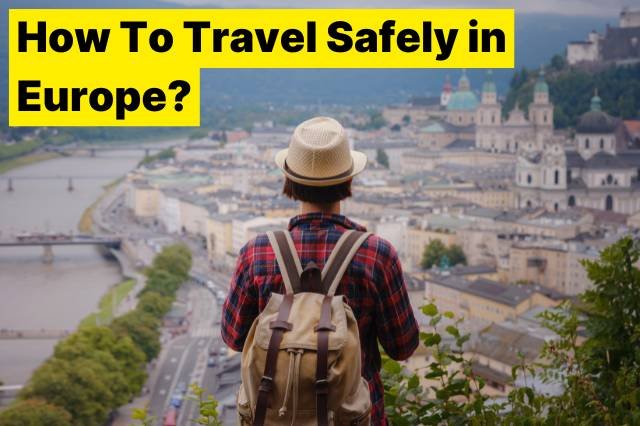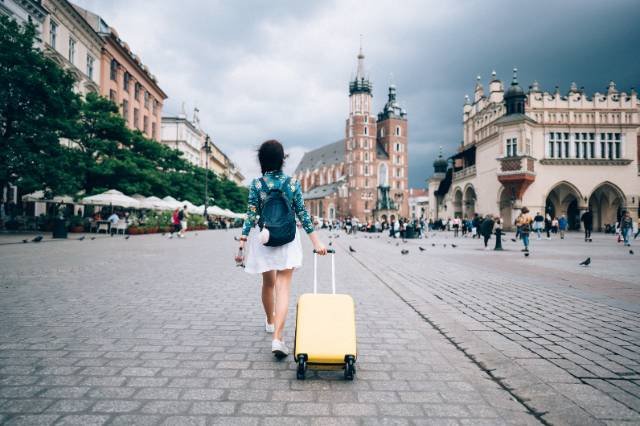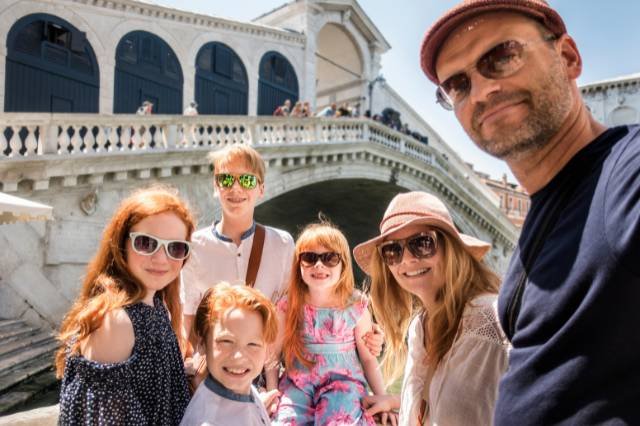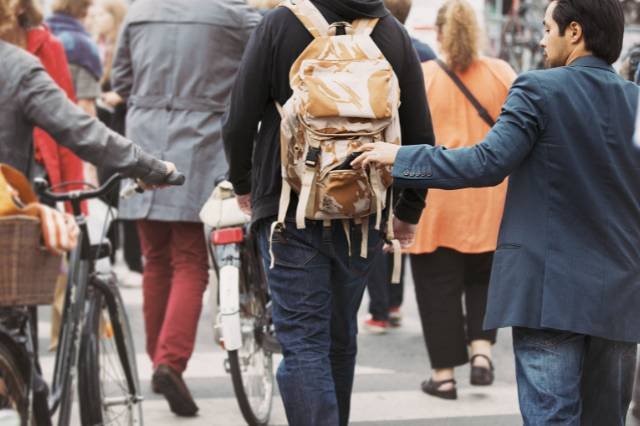Many dream of traveling through Europe, which offers a rich tapestry of history, culture, and breathtaking landscapes. However, ensuring your safety while exploring the continent is just as important as planning your itinerary.
This guide provides comprehensive Europe travel safety tips to help you navigate Europe confidently, whether you’re a solo traveler, part of a family, or venturing out for the first time.
How To Travel Europe Safely | Europe Travel Safety Tips

1. Follow General Safety Tips for Traveling in Europe
Understanding Safety in Europe
Europe is generally a safe destination, with lower crime rates than many other parts of the world. However, like any other popular tourist destination, it’s essential to stay vigilant. Understanding the common safety concerns and being prepared can significantly impact your travel experience.
Common Safety Concerns
When traveling in Europe, the most common safety issues you’ll encounter include pickpocketing, petty theft, and scams targeting tourists. These crimes are prevalent in crowded areas like tourist attractions, public transportation, and major cities.
To stay safe, keep these general tips in mind:
- Stay Aware of Your Surroundings: Keep your head up and be conscious of who and what is around you. Avoid distractions, such as being glued to your phone, especially in crowded areas.
- Keep Valuables Secure: Use a money belt or an anti-theft backpack to keep your belongings safe. It’s best to avoid carrying large sums of cash and expensive items.
- Blend in with the Locals: Try not to draw attention to yourself as a tourist. Dress modestly and respect local customs and traditions.
- Travel Insurance is a Must: Travel insurance is essential for any trip abroad. It covers unexpected events, including medical emergencies, trip cancellations, and even theft.
Solo Travelers: Europe Travel Safety Tips for Solo Travelers
Traveling alone can be incredibly rewarding, but it also has unique challenges. Here are some tips to ensure your safety as a solo traveler in Europe:
- Stay Connected: Always let someone know your plans, whether it’s a friend, family member, or your accommodation host. Keeping in regular contact can be crucial in case of an emergency.
- Choose Safe Accommodations: Opt for accommodations with good reviews, especially regarding safety. Hostels, hotels, or Airbnb options in well-lit, central locations are usually safer.
- Avoid Risky Areas: Research the neighborhoods you’ll be staying in or visiting. Avoid poorly lit or isolated areas, especially at night.
Female Travelers: Europe Travel Safety Tips Solo Female

Women traveling alone in Europe should take extra precautions to ensure their safety:
- Personal Safety First: Carry a personal alarm or pepper spray, and be aware of your surroundings, especially when out at night.
- Avoid Unwanted Attention: While Europe is generally respectful, some areas may have different cultural norms. Dress modestly to avoid drawing unwanted attention, and be cautious when interacting with strangers.
- Trust Your Instincts: If something feels off, trust your gut. Whether it’s declining an invitation or leaving an uncomfortable situation, it’s always better to be safe than sorry.
Related: Ultimate Guide to Solo Female Travel in Europe
Families: Europe Travel Safety Tips for Families

Traveling with children adds an extra layer of responsibility, but with the right precautions, it can be a stress-free experience:
- Keep Your Kids Close: Make sure your children are always within sight in crowded areas. Consider using child safety wristbands or even leashes for younger kids.
- Stay Together: Always stick together, especially in busy tourist spots. It’s easy to get separated in the hustle and bustle, so establish a meeting point in case anyone gets lost.
- Choose Family-Friendly Destinations: Opt for destinations that are known to be safe and have plenty of activities for children. Eg: Disneyland, Zoo, Park
Winter Travel Safety: Europe travel safety tips during winter
Europe in winter can be magical, with its festive markets and snow-covered landscapes. However, winter travel comes with specific safety concerns:
- Handling Icy Conditions: Be cautious when walking on icy streets or sidewalks. Wear appropriate footwear with good traction, and take your time to avoid slips and falls.
- Pack for Cold Weather: Layer up with warm clothing, including a good quality coat, gloves, hat, and scarf. It’s better to overpack for warmth than risk being cold.
- Driving Safety: If you plan to drive during winter, ensure your rental car is equipped with winter tires and that you’re familiar with driving in snowy or icy conditions.
Summer Travel Safety: Europe travel safety tips during summer
Summer in Europe is a peak travel season, but it also comes with its challenges:
- Dealing with Heat: Europe can get extremely hot, especially in southern regions. Stay hydrated, wear sunscreen, and take breaks in the shade or air-conditioned places.
- Avoid Tourist Traps: Popular destinations can be overcrowded, leading to increased chances of theft or scams. Be extra vigilant in places like Rome, Paris, or Barcelona.
- Plan Ahead: Summer is also the time for festivals and public holidays. Research in advance to avoid closed attractions or overbooked accommodations.
2. Avoid Common Scams and Risks in Europe
Europe is known for certain scams targeting unsuspecting tourists. Being aware of these scams can help you avoid falling victim.
Pickpocketing Hotspots
Pickpocketing is a widespread issue in Europe, particularly in tourist-heavy areas. Hotspots include public transportation, busy streets, and major attractions like the Eiffel Tower or the Colosseum.

- How to Protect Yourself: Keep your valuables in a money belt or an anti-theft bag. Avoid keeping your wallet in your back pocket, and be cautious in crowded areas.
Most Common Scams to Avoid in Europe
Several scams are common across Europe:
- The Fake Petition: Scammers will ask you to sign a petition, often as a distraction while they or an accomplice pickpockets you.
- Overcharging: Be cautious of taxis or restaurants that overcharge tourists. Always agree on a fare before getting into a taxi, and check your bill carefully in restaurants.
- Friendship Bracelets: In some areas, individuals may offer you a “free” bracelet, only to demand money once it’s on your wrist. Politely decline and walk away.
How to Protect Your Valuables?
- In Hotels: Use the hotel safe for valuables, and don’t leave anything expensive in your room.
- In Public: Carry only what you need for the day. Leave extra cash, cards, and your passport in the hotel safe.
3. Strictly Follow Safety Tips for Traveling at Night
Exploring European cities at night can be a wonderful experience, but staying safe is important.
Stay Safe When Exploring at Night
- Stick to Well-Lit Areas: Stay on the main streets and avoid dark or isolated places. European cities are generally safe, but it’s better to be cautious.
- Travel in Groups: If possible, travel with others at night. There’s safety in numbers, and sharing the experience is more enjoyable.
- Use Trusted Transportation: Opt for trusted transportation options like licensed taxis or reputable rideshare services. Avoid walking alone late at night, especially in unfamiliar areas.
Choose Safe Accommodations
- Location Matters: Choose accommodations in central, well-lit areas. Research the neighborhood beforehand and opt for places with good reviews, particularly regarding safety.
- Check Security Features: Look for hotels or hostels with 24-hour front desks, secure entryways, and good lighting around the property.
4. Be Prepared For Health and Medical Emergencies
Being prepared for health-related issues and emergencies is crucial when traveling.
Health Precautions
- Vaccinations: Before traveling, ensure you’re up-to-date on routine vaccinations. Some countries may require additional vaccines, especially if you’re visiting rural areas.
- Carry a First Aid Kit: A basic first aid kit with band-aids, antiseptic wipes, and any necessary medications can be invaluable during your trip.
- Understand Local Healthcare: Familiarize yourself with how the healthcare system works in the countries you’ll be visiting. Know the nearest hospital or clinic, and keep emergency numbers handy.
Emergency Contacts
- Know the Local Emergency Numbers: In Europe, the general emergency number is 112, it is your life-saving number. It is the European emergency phone number, available everywhere in the EU, free of charge. But it’s worth knowing the specific numbers for the countries you’re visiting.
- Embassy Information: Keep your country’s embassy or consulate contact information handy in case of serious emergencies, such as losing your passport or needing legal assistance.
5. Pack Essentials for a Safe Trip: Things To Do Before Travelling
Packing smartly can enhance your safety and comfort during your travels.
Packing List for Safety
- Money Belt: A money belt can keep your cash, cards, and passport safe from pickpockets.
- Portable Charger: Keeping your phone charged is essential for navigation and emergencies.
- Secure Bags: Choose bags with zippers and anti-theft features to deter thieves.
Install Essential Apps and Tools
- Navigation Apps: Use apps like Google Maps or Citymapper to navigate cities efficiently.
- Translation Apps: Google Translate can help overcome language barriers.
- Emergency Alert Apps: Consider downloading apps that offer local emergency alerts, which can be crucial in case of natural disasters or other crises.
Country-Specific Safety Tips
While Europe is generally safe, some countries have specific considerations.
Safest Countries for Tourists
Countries like Iceland, Switzerland, and Denmark consistently rank among the safest in the world. They have low crime rates, excellent healthcare, and are very welcoming to tourists.
Countries Requiring Extra Caution
You should exercise extra caution in some countries, particularly those in Eastern Europe or regions with ongoing political issues. This doesn’t mean you should avoid these destinations, but being well-informed and prepared is important.
Special Considerations
- LGBTQ+ Travelers: Europe is generally LGBTQ+ friendly, but some areas are more conservative. Research your destinations and avoid public displays of affection in regions where it might be frowned upon.
- Cultural Sensitivity: Some European countries are more conservative. Be mindful of local customs and dress appropriately, particularly when visiting religious sites.
How Safe is Europe for American Tourists in 2025?
For American tourists, Europe will remain a safe destination in 2025. However, staying informed about any political changes, travel advisories, or health concerns that may affect your travel plans is essential. Keeping up with U.S. State Department advisories can help you make informed decisions.
Read More: How to Plan a Trip to Europe from the USA?
Conclusion – Safety Tips for Traveling in Europe
Traveling through Europe is an exciting adventure, filled with countless opportunities to explore diverse cultures and landscapes. However, safety should always be a priority. By following these Europe travel safety tips, you can ensure your journey is enjoyable and secure.
Remember, the key to a safe trip is being prepared and staying vigilant. Whether you’re a solo traveler, a family, or a first-time visitor, these tips will help you navigate Europe with confidence. Safe travels!
FAQs – How To Travel Europe Safely?
Is Europe safe for solo travelers?
Yes, Europe is generally safe for solo travelers. However, it’s essential to stay aware of your surroundings, choose safe accommodations, and avoid risky areas.
What are the safest countries to visit in Europe?
Countries like Iceland, Switzerland, and Denmark are considered some of the safest in Europe, with low crime rates and excellent healthcare.
How can I protect myself from pickpockets in Europe?
To protect yourself from pickpockets, use a money belt, avoid carrying valuables in your back pocket, and be extra vigilant in crowded areas.
What should I do in case of an emergency while traveling in Europe?
In case of an emergency, dial 112 for help. It’s also a good idea to have the contact information for your country’s embassy or consulate on hand.


